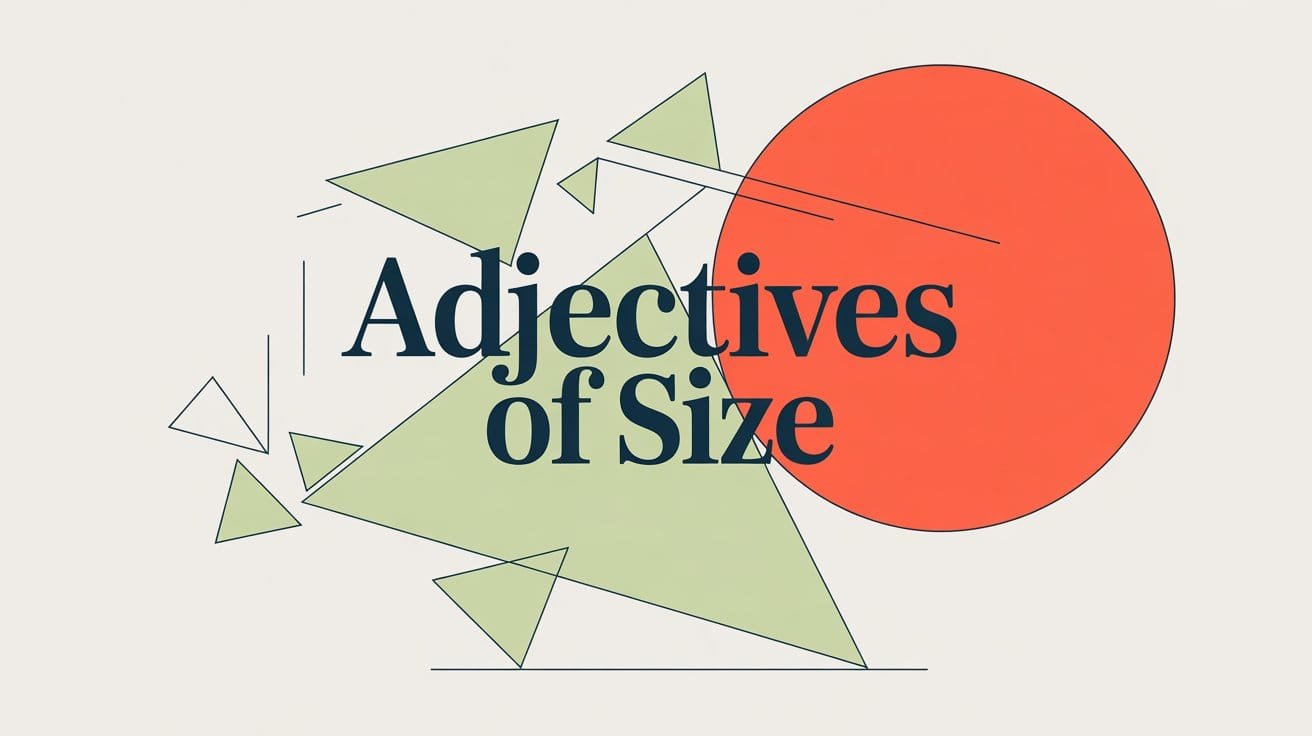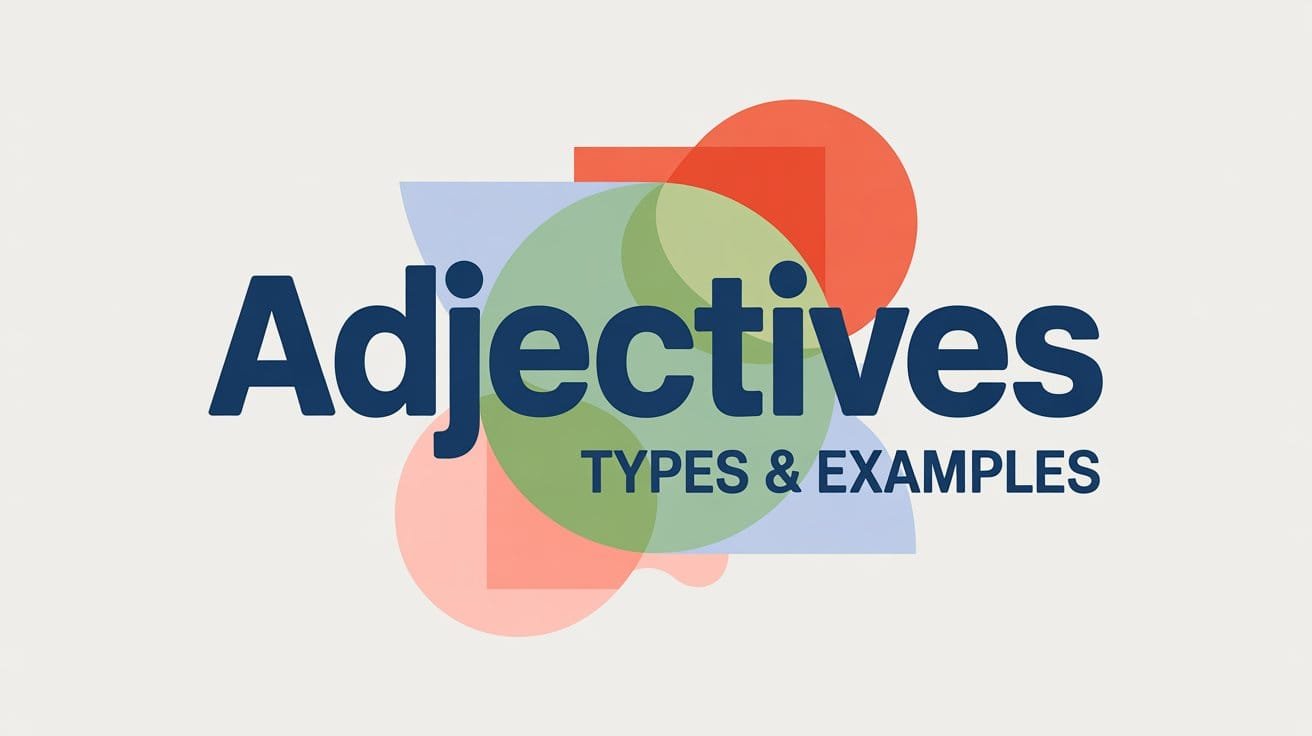Adjectives of size are words that describe the physical dimensions or overall scale of a noun. They tell us how big, small, tall, short, wide, or narrow something is. These adjectives answer the question “How big is it?” and often come before the noun they describe.
They are commonly used in everyday language to give shape to objects, people, and places, especially when specific measurements aren’t available.
Example: She wore a loose jacket over a tiny dress.
Size adjectives help make writing more descriptive and help listeners or readers form a mental image of what’s being described.
Types of Size Adjectives: General, Comparative, and Qualitative
Adjectives of size can be grouped by how they express size—some give basic information, others show comparison, and some add a sense of scale or exaggeration.
| General Size | Comparative / Graded | Relative or Qualitative |
|---|---|---|
| big | bigger | oversized |
| small | smaller | undersized |
| large | larger | bulky |
| tall | taller | compact |
| short | shorter | cramped |
| wide | wider | spacious |
| thin | thinner | petite |
| long | longer | towering |
- General adjectives simply state size (e.g., big, small, tall).
- Comparative adjectives compare one thing to another (e.g., larger, shorter).
- Relative or qualitative adjectives offer a sense of degree or impression (e.g., bulky, cramped, oversized).
This grouping helps you choose words more purposefully—whether you’re describing something exactly, comparing it, or just giving a sense of scale.
List of 50 Adjectives of Size In English
Below is a varied list of adjectives that describe size, from exact measurements to more relative or expressive terms. These words help describe objects, spaces, people, and more with greater precision.
| bulky | lanky | roomy | stubby | skimpy |
| hefty | shallow | meager | towering | expansive |
| dense | thickset | elongated | hefty | tiny |
| cramped | oversized | slim | squat | sizeable |
| compact | hefty | towering | narrow | swollen |
| lightweight | stretched | puny | jumbo | slanted |
| squat | meaty | thin | heavy | towering |
| narrowest | voluminous | minimal | plump | moderate |
| inflated | droopy | shallow | sharp-edged | blocky |
| ample | long-limbed | broad | tapering | short-limbed |
Examples of Adjectives of Size in Sentences
These examples show how adjectives of size can describe people, places, objects, and abstract ideas. Each sentence uses a different adjective to highlight scale or dimension.
The bulky package barely fit through the doorway.
The lanky statue stood awkwardly at the garden’s edge.
The roomy suitcase had plenty of space for souvenirs.
The stubby pencil was too short to use comfortably.
The skimpy curtain barely covered the window.
The hefty dictionary took up most of the desk.
The shallow drawer held only a few utensils.
The meager serving left everyone still hungry.
The towering skyscraper dominated the city skyline.
The expansive lawn stretched beyond the fence.
The dense forest was hard to walk through.
The thickset bookshelf supported dozens of heavy volumes.
The elongated table could seat twelve people.
The hefty suitcase strained the luggage scale.
The tiny kitten fit in the palm of her hand.
The cramped hallway made it hard to pass through.
The oversized chair looked out of place in the small room.
The slim notebook slid easily into her bag.
The squat bottle was hard to grip.
The sizeable crowd gathered around the stage.
The compact sofa was ideal for small apartments.
The hefty toolbox needed two hands to carry.
The towering pine trees lined the driveway.
The narrow path led to a hidden garden.
The swollen river spilled over its banks.
The lightweight jacket was perfect for spring.
The stretched fabric looked worn at the seams.
The puny flashlight barely lit up the room.
The jumbo sandwich could feed two people.
The slanted roof caused rain to run off quickly.
The squat jug had a wide base and short neck.
The meaty burger dripped with sauce.
The thin blanket didn’t keep her warm at night.
The heavy book landed with a thud.
The towering mountains blocked the morning sun.
The narrowest street in the village was barely walkable.
The voluminous dress flowed dramatically when she turned.
The minimal decor made the space feel clean and open.
The plump berries burst with juice.
The moderate pace suited the entire hiking group.
The inflated balloon hovered near the ceiling.
The droopy plant needed water badly.
The shallow puddle reflected the cloudy sky.
The sharp-edged glass must be handled with care.
The blocky sculpture had no curves at all.
The ample closet had space for everything.
The long-limbed dancer moved with elegance.
The broad shoulders gave him a strong frame.
The tapering column drew the eye upward.
The short-limbed dog waddled across the yard.
FAQs About Adjectives of Size
What is an adjective of size?
It’s a word that describes the physical scale or dimension of a noun, such as large, small, narrow, or bulky.
Can you use more than one size adjective in a sentence?
Yes, especially when comparing or describing multiple items. Example: We bought a larger, thicker mat for the patio.
Do adjectives of size come before or after the noun?
They almost always come before the noun in English. Example: A huge mirror hung above the fireplace.
Are words like “spacious” or “compact” size adjectives?
Yes. Even though they don’t directly state measurements, they describe the relative size or space something offers.



